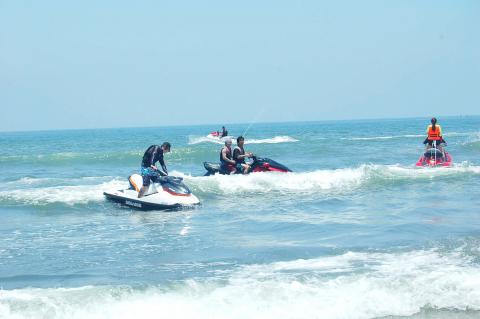The Southwest Coast National Scenic Area Administration said it was considering setting up the nation’s first public nude swimming area in Masago Beach (馬沙溝) in Greater Tainan.
According to the agency’s acting director-general, Cheng Rong-fong (鄭榮峰), it has commissioned a firm to evaluate the viability of the proposal, which could help increase tourism revenue in southern Taiwan.
International tourists have been reported to enjoy nude swimming and sunbathing at the far end of Masago Beach.

Photo: Yang Chin-cheng, Taipei Times
Saying that the law does not actually ban nude swimming, Cheng said hot spring operators can separate regular bathers and nude bathers with tall picket fences, and a similar practice could be applied to regulate nude swimmers on the beach.
However, the practice must be carefully arranged so that it does not block public access to the beach, he added.
Cheng said Masago Beach was cleaner and safer for swimming than other beaches. Annual music festivals in Kenting in Pingtung County and Gongliao (貢寮) in New Taipei City (新北市) have created reputations for those places, and Masago needs to have its own unique feature to attract more tourists, he said.
Cheng added that the coastal areas of Greater Tainan, as well as Chiayi and Yunlin counties, have rich tourism resources, but residents in these localities rank low in terms of average income.
The agency must create new tourist attractions to generate revenue and cannot simply rely on government subsidies, he said.
Commenting on the proposal, Greater Tainan Mayor William Lai (賴清德) said many international tourists love Masago Beach because of its natural conditions.
However, he added that local swimmers might not be as open-minded as foreign visitors, and the city cannot afford to alienate local swimmers because of a few people who love skinny dipping.
Lai said the proposed public nude swimming area could potentially attract more curious observers than nude swimmers, and that he needed to know more about the proposal before making any decision.

Aftershocks from a magnitude 6.2 earthquake that struck off Yilan County at 3:45pm yesterday could reach a magnitude of 5 to 5.5, the Central Weather Administration (CWA) said. Seismological Center technical officer Chiu Chun-ta (邱俊達) told a news conference that the epicenter of the temblor was more than 100km from Taiwan. Although predicted to measure between magnitude 5 and 5.5, the aftershocks would reach an intensity of 1 on Taiwan’s 7-tier scale, which gauges the actual effect of an earthquake, he said. The earthquake lasted longer in Taipei because the city is in a basin, he said. The quake’s epicenter was about 128.9km east-southeast

The Taipei Summer Festival is to begin tomorrow at Dadaocheng Wharf (大稻埕), featuring four themed firework shows and five live music performances throughout the month, the Taipei Department of Information and Tourism said today. The festival in the city’s Datong District (大同) is to run until Aug. 30, holding firework displays on Wednesdays and the final Saturday of the event. The first show is scheduled for tomorrow, followed by Aug. 13, 20 and 30. To celebrate the 30th anniversary of Disney Pixar's movie Toy Story, the festival has partnered with Walt Disney Co (Taiwan) to host a special themed area on

BE CAREFUL: The virus rarely causes severe illness or death, but newborns, older people and those with medical conditions are at risk of more severe illness As more than 7,000 cases of chikungunya fever have been reported in China’s Guangdong Province this year, including 2,892 new cases last week, the Centers for Disease Control (CDC) yesterday said it is monitoring the situation and considering raising the travel notice level, which might be announced today. The CDC issued a level 1 travel notice, or “watch,” for Guangdong Province on July 22, citing an outbreak in Foshan, a manufacturing hub in the south of the province, that was reported early last month. Between July 27 and Saturday, the province reported 2,892 new cases of chikungunya, reaching a total of 7,716

The New Taipei City Government today warned about the often-overlooked dangers of playing in water, and recommended safe swimming destinations to cool off from the summer heat. The following locations in the city as safe and fun for those looking to enjoy the water: Chienshuiwan (淺水灣), Baishawan (白沙灣), Jhongjiao Bay (中角灣), Fulong Beach Resort (福隆海水浴場) and Sansia District’s (三峽) Dabao River (大豹溪), New Taipei City Tourism and Travel Department Director-General Yang Tsung-min (楊宗珉) said. Outdoor bodies of water have variables outside of human control, such as changing currents, differing elevations and environmental hazards, all of which can lead to accidents, Yang said. Sudden